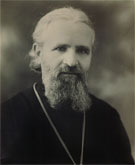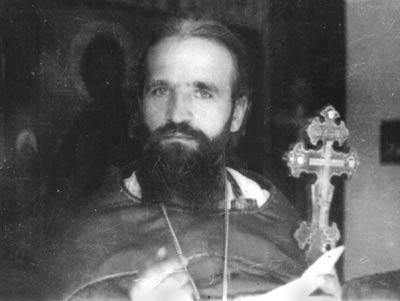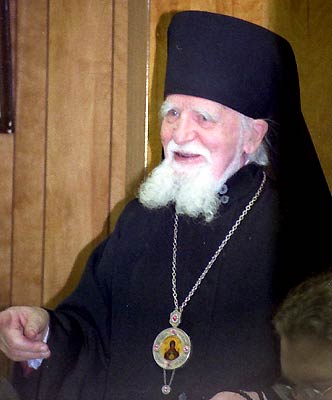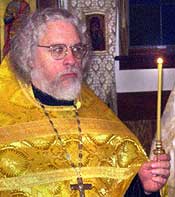In Memory of Bishop Mitrophan (Znosko-Borovsky)

On the morning of February 15 (February 2 Old Style), 2002,
on the feast of the Meeting of the Lord, precisely at ten o'clock, at the
precise moment that the liturgy was beginning, Bishop Mitrophan reposed following
a short illness. A great, toil-filled, and edifying life came to an end.
It is not easy to write about one close to you after he has passed away; and
Vladyka was more than simply a pastor. Owing to his many labors, he was widely
known in the Church and in social circles in both Russia and in the emigration,
making this task even more challenging. Many disparate attitudes toward him
developed long ago. I will leave the job of dispassionately evaluating him
to Church historians of the future. But my feeling of debt-a debt of love
and gratitude to Vladyka for everything that he gave us, his junior pastors
and his pupils-obligates me to say a word in his memory.
Mitrophan Znosko-Borovsky was born into the family of a parish priest on August
17 (August 4 O.S.), 1909, in the city of Brest-Litovsk. During the First World
War, his father served as a regiment priest in the Finnish Infantry Division
and was awarded a series of decorations for his valor, including a gold cross
on a Saint George ribbon. Vladyka's mother died of typhus when he was nine
years old, and his older sister Olga took his upbringing upon herself. Two
of his brothers-Arseny and Aleksey-likewise served God as priests. Arseny,
the older of the two, was tortured to death by the communists in 1925, while
the younger Aleksey, also now reposed, served in the Polish Orthodox Church
and also suffered at the hands of the godless for his work in the Church,
spending eight years in prison.
Upon finishing the gymnasium in Brest-Litovsk and deciding that he wanted
to serve the Church, student Znosko enrolled in the Theological Faculty of
Warsaw University. At that time, the Orthodox Church in Poland was enduring
a difficult period, as the Polish government was imposing Polonization on
the Church. The young Mitrophan underwent a major struggle as he strove to
defend Russian interests in the Theological Faculty and consequently transferred
to the Theological Faculty of Belgrade University as a recipient of a scholarship
from Patriarch Varnava. Aside from studying theology, Mitrophan Konstantinovich
visited Metropolitan Antony on a daily basis as obedience during his entire
stay in Belgrade.These edifying meetings with the great hierarch gave the
young Mitrophan as much, if not more, than his formal studies. During his
time in Belgrade, the young student also became closely acquainted with Hieromonk
John (Maximovich), whose parents' house he visited and whose consecration
to bishop of Shanghai he attended. A spiritual connection, as well as one
of friendship, persisted between Father Mitrophan and Archbishop John until
the blessed repose of the latter.
Having graduated from the Theological Faculty in Belgrade in 1934, Mitrophan
Konstantinovich returned to Poland. Upon passing all of the necessary exams
and fulfilling all of the requirements of the Theological Faculty at Warsaw
University, he received a Masters of Theology.
Mitrophan Konstantinovich entered into marriage with Alexandra Semenovna Tsibrouk-the
daughter of an archpriest of the city of Belsk-and was ordained a deacon on
September 1, 1935, in the city of Pinsk. On June 12 (June 25 O.S.), 1936,
on the day of St. Onuphrius the Great, Archbishop Alexander of Pinsk and Poless'e
ordained Father Mitrophan to the priesthood at Yablochinsky Monastery.
His fifty-four years as a priest were the most intense and focused for Father
Mitrophan in terms of pastoral work. Some dates serve as signposts: Dormition
Parish in the village of Omelenets, Byelorussia (1936-38); Saint Nicholas
Brotherhood Church in Brest-Litovsk (1938-44); wartime travels in Germany
and Austria, and Camp Moenchehof (1944-48); Dormition Church in Casablanca
(1948-59); and Saint Seraphim Church in Sea Cliff, New York, U.S.A. (1959-2002).
 The
Moroccan period was especially fruitful for Father Mitrophan in terms of pastoral
work; the Hierarchical Synod appointed him administrator of the churches of
Northern Africa. There, Father had to care for an émigré flock
of many thousands dispersed across Northern Africa. Aside from caring for
their souls, Father took part in building churches, and provided spiritual
guidance for all of the local Russian social organizations. Archpriest Mitrophan
Znosko was awarded a miter for his outstanding merits before the Church by
ukase No. 1991 of the Hierarchical Synod. While in Morocco, Father Mitrophan
kept close ties with Archbishop John (Maximovich), who was then living in
Paris and was closest in proximity to Africa of all the bishops. During this
period, Father Mitrophan's older daughter, Anna, was cured of polio through
the prayers of Archbishop John.
The
Moroccan period was especially fruitful for Father Mitrophan in terms of pastoral
work; the Hierarchical Synod appointed him administrator of the churches of
Northern Africa. There, Father had to care for an émigré flock
of many thousands dispersed across Northern Africa. Aside from caring for
their souls, Father took part in building churches, and provided spiritual
guidance for all of the local Russian social organizations. Archpriest Mitrophan
Znosko was awarded a miter for his outstanding merits before the Church by
ukase No. 1991 of the Hierarchical Synod. While in Morocco, Father Mitrophan
kept close ties with Archbishop John (Maximovich), who was then living in
Paris and was closest in proximity to Africa of all the bishops. During this
period, Father Mitrophan's older daughter, Anna, was cured of polio through
the prayers of Archbishop John.
The last and most lengthy period of his service was in Sea Cliff, a suburb
of New York. Father arrived in America at the age of fifty, already possessing
an abundance of pastoral experience and many harsh life lessons (the early
loss of his mother, famine, persecution at the hands of the Polish authorities
for Orthodoxy and "Russianness," brutal interrogations by both the
NKVD during the Soviet occupation of Brest and by the Gestapo), tempered by
life's hardships, yet still full of strength and energy. Father Mitrophan
was assigned directly to Metropolitan Anastasy, who directed him to visit
monthly as obedience. The Metropolitan valued Father Mitrophan's talents and
personal qualities, and he placed high hopes in him with regard to assisting
in Church administration.
But one must mention that those who surrounded the Elder-Metropolitan, likely
out of a series of personal agendas, regarded Father Mitrophan quite differently
and Metropolitan Anastasy's hopes did not materialize. Father underwent much
sorrow during his years of service in America: the hatred of certain individuals;
attacks; undeserved slander; and absurd accusations of ecumenism, solidarism,
and collaboration with the KGB, sometimes emanating even from Church circles.
Father steadfastly endured, always remembering for Whom he had to bear these
things. The Holy Gospel teaches that you can know a person by the fruits he
brings forth; therefore, it is appropriate to mention here as a statement
of truth, with full responsibility for these words, that Bishop Mitrophan
brought forth abundant spiritual fruits in both the emigration and in Russia
through his living word and through print. As for his ill-wishers, their fruits
are also clear to see: the Valentinite schism in Russia and the Mansonville
schism in America, as a result of which these people find themselves outside
the Church. Those who have ears to hear, let them hear.
The pastoral work of the reposed bishop was unique in its comprehensiveness
and clear vision of a goal. The consciousness that he was Christ's warrior,
standing on God's watch in the Church Militant, never left him. When making
any decision, he was always guided by his pastoral conscience and the thought
of what answer he would give before his Pastor-Leader Christ.
Strict toward himself, affectionate and forgiving toward others, he was truly
a good shepherd, giving his life for his sheep. He saved many from death behind
the walls of the NKVD during the Soviet occupation of Byelorussia. He also
saved Jews, hiding them from fascist executioners and placing himself in mortal
danger. Father lived through the life of his flock, rejoicing in their joy
and sorrowing in their sorrow. He knew his parishioners-his "sheep."
He "called them by name," and they followed him because they "knew
his voice." His treatment of the infirm was instructive. He visited the
sick in the homes and in the hospital every day while he still drove a car
and often even afterward. More than once I heard him say: "I have to
go to such and such a place, but I cannot right now, because I have people
in my parish who are seriously ill or dying." Owing to this, he never
took a vacation until an assisting priest was appointed to him, and even then
he would go away exceedingly rarely. His concern for the sick was particularly
palpable during proskomedia. He commemorated each name with such thoroughness
and love, coming to church many hours before the start of liturgy. Father
Mitrophan's flock repaid him with the same love; this was especially evident
during the funeral service, which parishioners from Morocco, Germany, and
even Brest attended.
Aside from his work in the parish, Bishop Mitrophan was an instructor to many
pastors in our Church. In memory of his older brother, Priest Martyr Arseny,
Vladyka taught at the Holy Trinity Seminary for many years without remuneration.
During Bishop Averky's illness, he held the position of rector. I recall that,
while he was the rector, there were some positive changes in the life of the
seminary. Washing machines were obtained and set up, which meant that there
was no longer a need for seminarians to travel to the neighboring town. Previously,
seminarians had to go through the process of requesting permission to do so
from the seminary administration. At the same time, the process of receiving
consent for brief departures from the seminary grounds was simplified, sparing
us unnecessary complications with our inspections. Vladyka continued his tradition
of visiting the sick. I remember how I was once lying sick in bed. I had a
high temperature and was unable to attend class for a few days. Suddenly,
the door opens. Father Mitrophan, who had arrived from New York for his lectures,
enters. He moved a chair close to my bed, sat down, and spent more than an
hour with me. He gave me a good deal of attention, exhibiting a genuine interest
in my studies and in me personally. Such visits are never forgotten. For several
years, Vladyka taught various subjects at the seminary. During my time there,
he taught Apologetics and Comparative Theology. His lectures were never dry
yet full of content. His formulations were accurate and precise. His comments
about ecumenism stayed with me to this day: "If there is ever an ecumenical
unification of churches, the resulting church will, in reality, be neither
one, nor holy, nor apostolic." Vladyka complemented his lectures with
many examples from his rich life experience. For example, when he talked about
Catholicism, his considerations were not based on something he read in a book
but on personal contact with the Catholic Church in Poland. Father Mitrophan
compiled a book on comparative theology that is now widely used in Russian
theological academies and seminaries. He has also written: In Defense of the
Truth (a collection of on Church and social issues); a collection of sermons
following the annual cycle of services; and Chronicle of One Life (autobiographical
sketches).
Many clergy made use of Bishop Mitrophan's fatherly suggestions in their pastoral
practice. He helped many avoid unpleasantness in the order of service and,
having himself undergone many trials, he shielded his brethren from ominous
administrative exaction on more than one occasion.
In 1989, Father Mitrophan's loyal fellow-traveler in life, Matushka Alexandra
Semenovna, departed to the other world. Having accepted this loss with Christian
humility, Father Mitrophan was called upon to become a bishop in 1990. He
declined his lot several times on account of his advanced age, but finally
accepted it as God's will.
 Father
Mitrophan's consecration to bishop took place in Montreal on November 24 (November
11 O.S.), 1992, the day the Church commemorates the appearance of the myrrh-bearing
Iveron Icon of the Mother of God. The last nine years of his life, Vladyka
was the vicar of the Eastern American Diocese with the title of Bishop of
Boston; until recently, he served and played an active role in Church life.
Father
Mitrophan's consecration to bishop took place in Montreal on November 24 (November
11 O.S.), 1992, the day the Church commemorates the appearance of the myrrh-bearing
Iveron Icon of the Mother of God. The last nine years of his life, Vladyka
was the vicar of the Eastern American Diocese with the title of Bishop of
Boston; until recently, he served and played an active role in Church life.
In our tumultuous times, when the Church is experiencing troubles, suffering
blows first from one side and then the other, when it is difficult for us
who live in the emigration to understand the changes in Russia, and the same
events are evaluated in different ways, we often witness minds wander and
spirits break. In these complex circumstances, Bishop Mitrophan's persona
clearly rose above those surrounding him. While occupying the humble post
of a vicar bishop, Vladyka commanded enormous moral authority, and many bishops
and priests-both those living abroad and those from Russia-came to him for
advice. For all of us, he was a living link to the hierarchs: Metropolitan
Antony, Metropolitan Anastasy, Saint John of Shanghai, and other pillars of
our Church. The combination of erudition, pastoral experience, and superlative
personal qualities helped Vladyka provide exact and definite answers to questions
posed to him. One could say that he was the conscience of our Church. Vladyka's
positive outlook on the changes in Russia was expressed in his last Nativity
epistle: "Observing what is occurring in our homeland, I sense and see
the nearing of a feast of the Sun of Righteousness, the day when Orthodox
Russia, tempered by fire, will take her appointed place among the family of
nations and will reestablish political and moral balance in the whole world."
Vladyka's faith in a better future in Russia was not limited to words. He
donated money, and not a mere ten-thousand, to charitable causes in the now-resurrecting
Russia. In general, Vladyka extensively took part in charity, and anyone who
came to him for help would not leave empty-handed.
In conclusion, I would like to share with you a testament that Vladyka gave
me during my last visit, approximately a week before his passing, since these
words relate not only to me but can serve as a spiritual testament to all
clergy. Seeing me for the first time with a cross of my chest, Vladyka, already
weak and bedridden, told me: "I congratulate you on your ordination to
the priesthood. Be prepared to endure human malice and slander for Christ.
Be strict toward yourself, and remember that we are servants of the Living
God, and not anybody's lackeys." These words were undoubtedly a reflection
of Vladyka's personal life-long pastoral experience.
Metropolitan Laurus, along with Bishops Michael of Montreal and Canada, Alexander
of Buenos Aires and South America and many clergy, conducted Bishop Mitrophan's
funeral on February 18 (February 5 O.S.) in Saint Seraphim's Church in Sea
Cliff. On the following day, February 19 (February 6 O.S.), Metropolitan Laurus
served a festive panikhida, after which Bishop Alexander conducted the burial
of Bishop Mitrophan at the monastery cemetery, next to the grave of Matushka
Alexandra Semenovna. Memory eternal to you, dear Vladyka!
Priest Andre Papkov

First published in Orthodox Russia, No. 5, 2002.